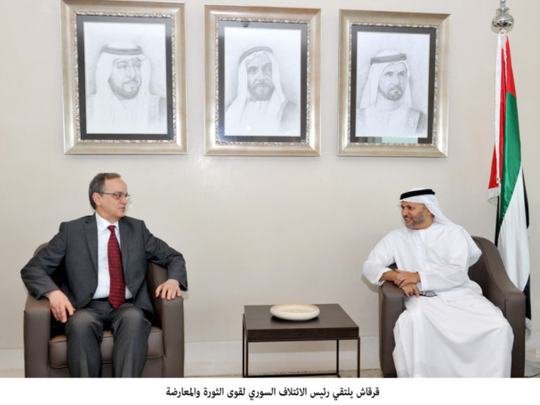
Abu Dhabi: The Syrian Coalition will not allow any armed group to enforce its ideology on the Syrian people, said Hadi Al Bahra, leader of the Syrian opposition coalition on Sunday.
“The Syrian Coalition stands ready and willing to partner with the international community not only to defeat the Islamic State of Iraq and the Levant (Isil) but also to rid the Syrian people of the tyranny of the Al Assad regime,” the head of the Syrian coalition told a news conference in Abu Dhbai.
Al Bahra stressed that US and Arab strategies and that of the Syrian coalition are identical in terms of objectives, but when it comes to means to achieve these goals they differ.
The head of Syria’s main Western-backed opposition group said the coalition hoped the international community will back more arms and other socio-economic assistance to moderate opposition forces in Syria.
“The coalition is 100 per cent committed and able to drive terrorism out of Syria,” Al Bahra said, stressing that the Syrian coalition will fill the vacuum after Isil’s defeat.
The Syrian leader held talks with Dr. Anwar Gargash, State Minister for Foreign Affairs, on the situation in Syria and the international coalition against terrorism. Gargash underscored the UAE’s support of the legitimate demands of the Syrian people, and Syrian unity as well as constant keenness to alleviate the dire humanitarian conditions there.
Al Bahra’s remarks came only days after a group consisting of the Gulf Cooperation Council, Egypt, Iraq, Jordan, Lebanon and the US agreed to “stand united against the threat posed by all forms of terrorism” — specifically naming Isil.
In a communiqué, those countries “agreed to do their share in the comprehensive fight against Isil, including stopping the flow of foreign fighters, countering the group’s financing, contributing to humanitarian efforts and joining in the many aspects of a coordinated military campaign against Isil.”
On Wednesday Obama authorised airstrikes against Isil targets inside Syria for the first time, pledging to destroy its fighters “wherever they exist.” He had previously said the US would act through a coalition — presumed to include regional and NATO allies — but on Wednesday did not name names, and it was not immediately clear what role each ally would play.
On Thursday, the foreign minister of Germany said his country would not be taking part in airstrikes in Syria, while British Prime Minister David Cameron’s spokesman said the United Kingdom was not ruling out military action against Isil. Al Bahra held Al Assad’s regime responsible for the creation of Isil and other terrorist and extremist groups in Syria.
Obama, on Wednesday, had also announced an expansion of strikes in Iraq, saying he would be dispatching nearly 500 more US troops to the country to assist its besieged security forces. He said the US would work with Kurdish and Iraqi ground troops to take over land that had been cleared by airstrikes.
In order to build up a viable partner on the ground in Syria, Obama has called on Congress to authorize a programme to train and arm vetted “moderate” rebels who are fighting both the Isil and Al Assad’s forces in Syria.
Analysts say US and Arab strategies seem to be aligned. “There is clearly a division of labor taking shape where the US and non-Arab allies will do the bulk of the kinetic operations against Isil while the Arab focus will be on humanitarian aid and developing a more robust campaign to counter Isil’s social media.,” said Dr Theodore Karasik, Director of Research and Development at the Institute for Near East and Gulf Military Analysis (Inegma).
“Both America and Arab countries have a vested interest in fighting terror at this juncture because of the overarching threat posed by not only Isil but also Al Qaida and other extremist groups. However, the Arabs do not trust America 100 percent in this matter, so time will tell how aligned their unity is,” Dr Karasik said.












